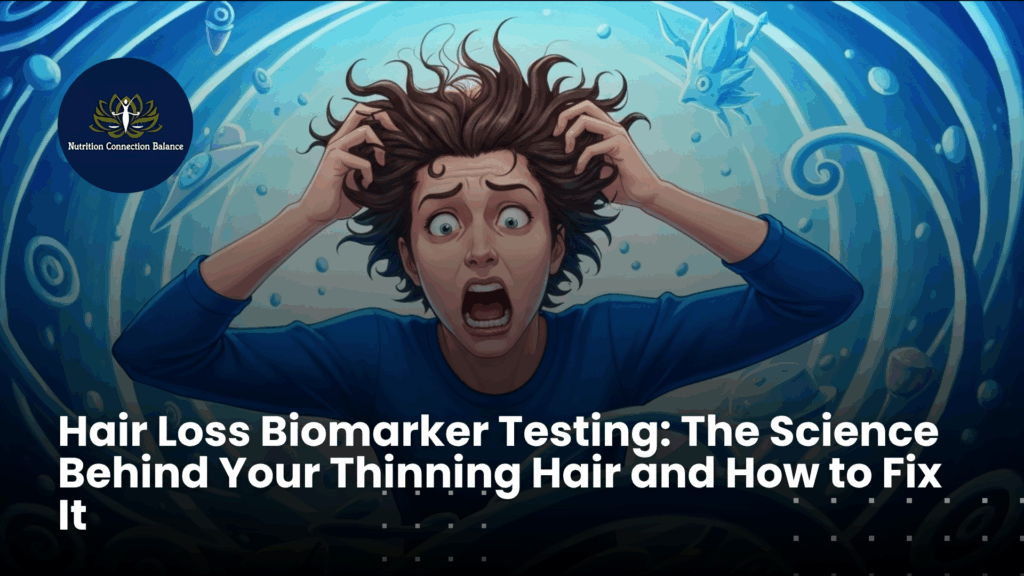
Have you noticed more hair in your brush lately? Maybe your part seems wider, or your ponytail thinner? If you’re experiencing hair loss, you’re not alone—and the solution might be hiding in your bloodstream.
While most treatments address only the symptoms, cutting-edge biomarker testing is revolutionizing how we understand and treat hair loss by targeting its biological roots. This approach is transforming frustrating hair loss journeys into stories of remarkable regrowth.
Hair loss has traditionally been blamed on genetics or aging, leaving many feeling helpless. But emerging science reveals a more complex—and hopeful—story.
“Most people don’t realize that hair loss is often a visible symptom of internal health imbalances,” explains Dr. Sarah Chen, endocrinologist and hair restoration specialist. “When we test specific biomarkers, we can see exactly what’s happening beneath the surface.”
These biological indicators act like a health dashboard for your hair follicles, revealing deficiencies, hormonal imbalances, and other issues that conventional treatments miss.

Research has identified several key biomarkers that directly influence hair growth and loss:
Vitamin D3 doesn’t just strengthen bones—it’s essential for hair follicle cycling and hormone regulation. Studies show that 85% of people with alopecia have vitamin D deficiencies.
“Vitamin D receptors in hair follicles play a crucial role in anagen (growth) phase initiation,” says Dr. Chen. “Without adequate levels, follicles can’t properly cycle through their growth stages.”
Optimal range: 50-80 ng/mL

High-sensitivity C-reactive protein (hs-CRP) measures inflammation levels in your body. Chronic inflammation can trigger follicular miniaturization—the process where robust hair follicles gradually shrink and produce thinner, weaker hairs.
“We often see elevated hs-CRP in patients whose hair loss hasn’t responded to conventional treatments,” notes trichologist Rebecca Moore. “Reducing this inflammation can be the missing piece in their hair recovery puzzle.”
Optimal range: Less than 1.0 mg/L
These hormones significantly impact both male and female hair patterns:
“Hormonal testing reveals patterns that explain why traditional one-size-fits-all approaches often fail,” explains Moore. “Two people with identical hair loss patterns might have completely different hormonal profiles requiring opposite approaches.”
Chronically elevated cortisol—your body’s primary stress hormone—can force hair follicles into the telogen (shedding) phase prematurely.
“I’ve seen patients lose significant hair volume during periods of intense stress,” says Dr. Chen. “Testing cortisol levels allows us to quantify this impact and address it directly rather than just telling patients to ‘relax more.'”
These minerals serve as building blocks for healthy hair:
A deficiency in any of these can halt hair growth even if everything else is optimal.
Elevated levels of mercury, lead, and other heavy metals can interfere with normal hair growth by displacing essential minerals and creating oxidative stress in follicles.
“Heavy metal testing often reveals environmental factors that would otherwise go undetected,” Moore explains. “This is particularly important for people who’ve tried everything else without success.”
Until recently, comprehensive biomarker testing required multiple doctor visits, expensive lab work, and often, frustrating dismissals from healthcare providers who didn’t recognize the connection between these markers and hair health.
Today, specialized at-home testing kits have democratized access to this information. Using a simple finger prick blood sample, these tests analyze all the critical biomarkers affecting your hair:
“This approach eliminates guesswork,” says Moore. “Instead of trying random supplements or treatments, you can target exactly what your body needs.”
Your test results create a unique biological portrait that explains your hair loss pattern:
The Stressed Shedder Profile:
This profile typically appears in high-achieving professionals experiencing diffuse thinning during stressful career periods.
The Hormonal Imbalance Profile:
Common in both men with male pattern baldness and women with PCOS or perimenopause.
The Nutritional Deficit Profile:
Frequently seen in people following restrictive diets or those with absorption issues.
The Environmental Exposure Profile:
More common in people living in urban areas or working in specific industries with higher toxic exposure.
Once your biomarker profile is established, treatment becomes precisely targeted:
Unlike generic hair vitamins, biomarker-guided supplement protocols deliver exactly what your body needs in the right proportions:
“When we correct a patient’s specific deficiencies rather than giving everyone the same formula, we see dramatically better results,” explains nutritionist Elena Vargas. “For example, someone with high inflammation but normal vitamin D needs a different approach than someone with optimal inflammation but low vitamin D.”
Test results often reveal lifestyle factors contributing to hair loss:
“The test gives us objective data to make specific lifestyle recommendations,” says Vargas. “It’s not about generic advice but precisely what will impact your biomarkers.”
Some imbalances may benefit from medical intervention:
Michelle K., 42, tried everything for her thinning hair before biomarker testing revealed severe vitamin D deficiency and elevated cortisol.
“I’d spent thousands on treatments that never addressed these core issues,” she says. “Within three months of following my personalized protocol, I noticed new growth all along my hairline—something I hadn’t seen in years.”
James T., 35, discovered through testing that his male pattern baldness was accelerated by zinc deficiency and high inflammation.
“Addressing these factors alongside traditional treatments gave me results I hadn’t achieved with conventional approaches alone,” he reports. “My crown has significantly filled in, which my dermatologist said was unusual for someone with my pattern.”
Ready to discover the real cause of your hair loss? Here’s how to start:
“The most important factor in hair regrowth success is identifying and addressing the specific causes rather than guessing,” emphasizes Dr. Chen. “Biomarker testing removes that guesswork.”
As biomarker testing becomes more accessible, the one-size-fits-all approach to hair loss is rapidly becoming outdated. The future belongs to personalized protocols based on your unique biology.
“We’re seeing success rates that were unimaginable just five years ago,” notes Dr. Chen. “Patients who were told their hair loss was permanent are experiencing significant regrowth by addressing these underlying factors.”
Your hair tells a story about what’s happening inside your body. With biomarker testing, you finally have the tools to understand that story—and change its ending.
Ready to discover what’s really causing your hair loss? Visit Nutrition Connection Balance to order your comprehensive biomarker test today.
Introducing all of the ways to work with us to optimize your health!
© 2025 - Nutrition Connection Balance.
Don’t miss our future updates!
Subscribe Today!